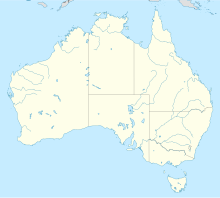Honeymoon Uranium Mine
| Location | |
|---|---|
| Location | Kalkaroo, South Australia[1] |
| State | South Australia |
| Country | Australia |
| Coordinates | 31°44′27″S 140°39′44″E / 31.74095°S 140.66236°E |
| Production | |
| Products | Uranium |
| Production | 37 tonnes |
| Financial year | 2013-2014 |
| History | |
| Opened | 2011 |
| Closed | 2013 |
| Owner | |
| Company | Boss Resources Limited |
| Website | https://bossresources.com.au |
| Year of acquisition | 2015 |
The Honeymoon Mine was Australia's second operating in-situ recovery uranium mine, beginning production in 2011.[2] It is located in South Australia and is 80 kilometres (50 mi) northwest of Broken Hill, New South Wales.
Honeymoon is a sandstone-hosted paleochannel deposit.[3] Operations at Honeymoon were suspended in November 2013, following difficulties in reaching production targets, high costs and a falling uranium price. The project was placed in care and maintenance,[4] then sold by Uranium One (a 100% subsidiary of Rosatom State Atomic Energy Corporation) to Boss Resources and Wattle Mining (as of March 2018 a subsidiary of Boss) in September 2015[5] for a sum of A$9 million. Boss Resources anticipates resuming production at the mine in 2019.[6]
History
[edit]The Honeymoon deposit was discovered in 1972 by a joint venture (Minad-Teton-CEC JV) between Mines Administration (a subsidiary of CSR Limited), Carpentaria Exploration (subsidiary of Mount Isa Mines) and Teton Exploration Drilling Co (subsidiary of United Nuclear Corporation).[7]
In 1981, Minad submitted a Final Environmental Impact Statement (EIS) to the South Australian and Commonwealth governments, and in 1982 established a $3.5 million demonstration 110 t/yr in-situ leach facility. The pilot plant comprised a pilot leach wellfield of three 5-spot leach patterns, a liquid disposal well, monitor wells, and a processing plant designed to treat pregnant leach solution at a rate of 25 liters per second. Before the pilot wellfield and the demonstration plant were commissioned, there was a change of government in both jurisdictions, approval to mine was deferred, and the project was placed in care and maintenance in June 1983.[7]
Between 15 March 1999 and 9 August 2000, a second series of leach trials was conducted. In May 2000, another EIS was produced by Southern Cross Resources (the Australian subsidiary of SXR Uranium One Inc). A mining licence was issued in 2001 and miscellaneous purposes licences were issued in 2002 and 2008.

Construction of the Honeymoon mine commenced in late 2009 and was completed in 2011.[8] Production from 2011 to 2013 was 312 tonnes of uranium. In November 2013 Uranium One announced "continuing difficulties in the production process and issues in attaining design capacity, combined with high mine operation costs." Honeymoon was shut down pending improved uranium prices and put on care and maintenance.[9]
Ownership
[edit]In May 1988, total project ownership was transferred to Carpentaria's parent company, MIM Holdings, and in 1997 sold to Southern Cross Resources. Southern Cross Resources later became Uranium One Australia Pty Ltd. Uranium One Australia Pty Ltd was purchased by Boss Resources in 2015.[8]
See also
[edit]References
[edit]- ^ "Search result for "Honeymoon Mine (Mine )" (Record no. SA0030973) with the following layers selected - "Suburbs and Localities" and " Place names (gazetteer)"". Property Location Browser. Government of South Australia. Archived from the original on 12 October 2016. Retrieved 5 October 2016.
- ^ Chris Russel (9 November 2011). "First ore for new uranium mine". The Advertiser. Retrieved 12 November 2013.
- ^ Jaireth, Subhash; Clarke, Jon; Cross, Andrew (March 2010). "Exploring for sandstone-hosted uranium deposits in paleovalleys and paleochannels". AusGeo News. Symonston, ACT: Geoscience Australia. Retrieved 17 April 2019.
- ^ "Honeymoon on Hold". World Nuclear News. 15 November 2013. Retrieved 15 March 2015.
- ^ Evans, Simon (1 September 2015). "Rosatom sells Honeymoon uranium mine in South Australia". The Sydney Morning Herald. Archived from the original on 9 December 2017. Retrieved 23 May 2018.
- ^ "Boss Resources Ltd envisages 2019 restart of Honeymoon uranium mine". Proactiveinvestors UK. Retrieved 23 May 2018.
- ^ a b "Honeymoon Project - Application Licence to Mine or Mill Radioactive Ore" (PDF). EPA South Australia. SXR Uranium One Inc. Retrieved 17 April 2019.
- ^ a b "Honeymoon Uranium Mine - Program for Environment Protection and Rehabilitation" (PDF). 12 April 2017. Retrieved 23 May 2018.
- ^ "Australia's Uranium Mines". World Nuclear Association. London. February 2019. Retrieved 18 April 2019.
External links
[edit]- Honeymoon Deposit Summary
- Frome Embayment Palaeochannel Uranium - Beverley, Four Mile, Honeymoon, Goulds Dam, Warrior
- "Honeymoon Project". Uranium One Inc. Archived from the original on 17 July 2011. Retrieved 21 July 2009.
- "Honeymoon uranium mine". australianmap.net. Archived from the original on 14 August 2013. Retrieved 15 June 2013.

